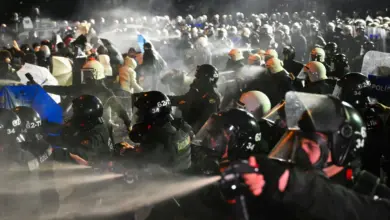The streets of Egypt erupted in jubilation yesterday after the announcement that Hosni Mubarak had resigned. Across the country, people relished the moment. Hundreds of thousands poured onto the streets to celebrate the end of Mubarak’s autocratic 30-year rule and welcome a new era where popular hopes for political freedom and economic prosperity can at last be realized.
The courage and resilience of the Egyptian people over the past weeks have inspired millions around the world. In an unprecedented display of popular unity, Egyptians transcended divisions of gender, religion, class, and political ideology that have long been exploited by the regime and banded together against a common enemy. Mubarak’s regime, founded on the principle that political stability must be imposed through a heavy-handed security state, unleashed its full arsenal of security tactics–riot police, thugs, provocateurs, secret police, and state propaganda–to put down the uprising. In the end, the regime badly miscalculated the people’s fearless resolve and inexorable yearning for change. The Egyptian revolution is indeed a testament to the power of popular struggle and will have profound effects on the entire region.
The revolution has made several gains over the past two weeks that few would have predicted. The ruling National Democratic Party has been sidelined from Egyptian politics, many leaders of the old regime have fallen, the state’s security apparatus and propaganda machine have collapsed, and, most astoundingly, a detested autocrat has been successfully toppled by the people. But the revolt has delivered another novelty that eclipses any immediate political payoffs: An Egyptian revolutionary spirit was born that has restored a sense of pride and self-worth to a people long crippled by a deep cynicism and a suffocating feeling of stasis. As the recently deputized Vice-President Omar Suleiman announced that the president had delegated his powers to the armed forces, anti-regime chants were suddenly drowned out by cries imploring people to raise there heads high because they were Egyptians.
In this time of joy, let us not forget that Egypt is witnessing a historic moment of hope and transformation that is far from complete. Those who nourished this revolution on the streets should now play a leading role in shaping the country’s political future. Mubarak’s resignation marks a time of opportunity, not a final triumph. In the days and months ahead, Egyptians must continue harnessing their collective energies to ensure that any political reforms go beyond the cosmetic and truly meet the people’s desire for freedom.
The pro-democracy movement has many legitimate demands that Egypt’s caretaker government must immediately begin acting upon. They include an end to the state of emergency, the release of all political prisoners, the dissolution of a fraudulently elected parliament, and a transition to a civilian government with a popular mandate, among others. Moving forward, the army must be pressured to meet these demands and follow through on its pledges to guide Egypt towards a democratic future. The power of popular mobilization must not be relinquished and people must hold the armed forces accountable every step of the way
Moved by a new sense of solidarity and self-empowerment, Egyptians once again flooded Tahrir Square this morning with many packing their tents, dismantling makeshift barricades, sweeping the streets and repainting the pavements, and scrubbing away graffiti. Mubarak’s warning of impending chaos in the event of his departure has been exposed as an absurd bluff. The impressive clean-up effort embodies the spirit of collective support that has sustained Tahrir Square over the past two weeks and offers a compelling vision of an alternative Egyptian society. But in the rush to return to “business as usual,” the imprints of the revolt still freshly etched on the buildings and streets of Tahrir must not be hastily effaced. They bear the memories of an extraordinarily hopeful moment when an oppressive status quo was overturned and a new political order molded. A return to normal might be too early right now, if ever at all possible. A yearning for the orderly and the routine should not defeat this historic opportunity to make a decisive break with the past and forge a new beginning. This moment, with all its possibilities, must be embraced. That would be a truly revolutionary act.




